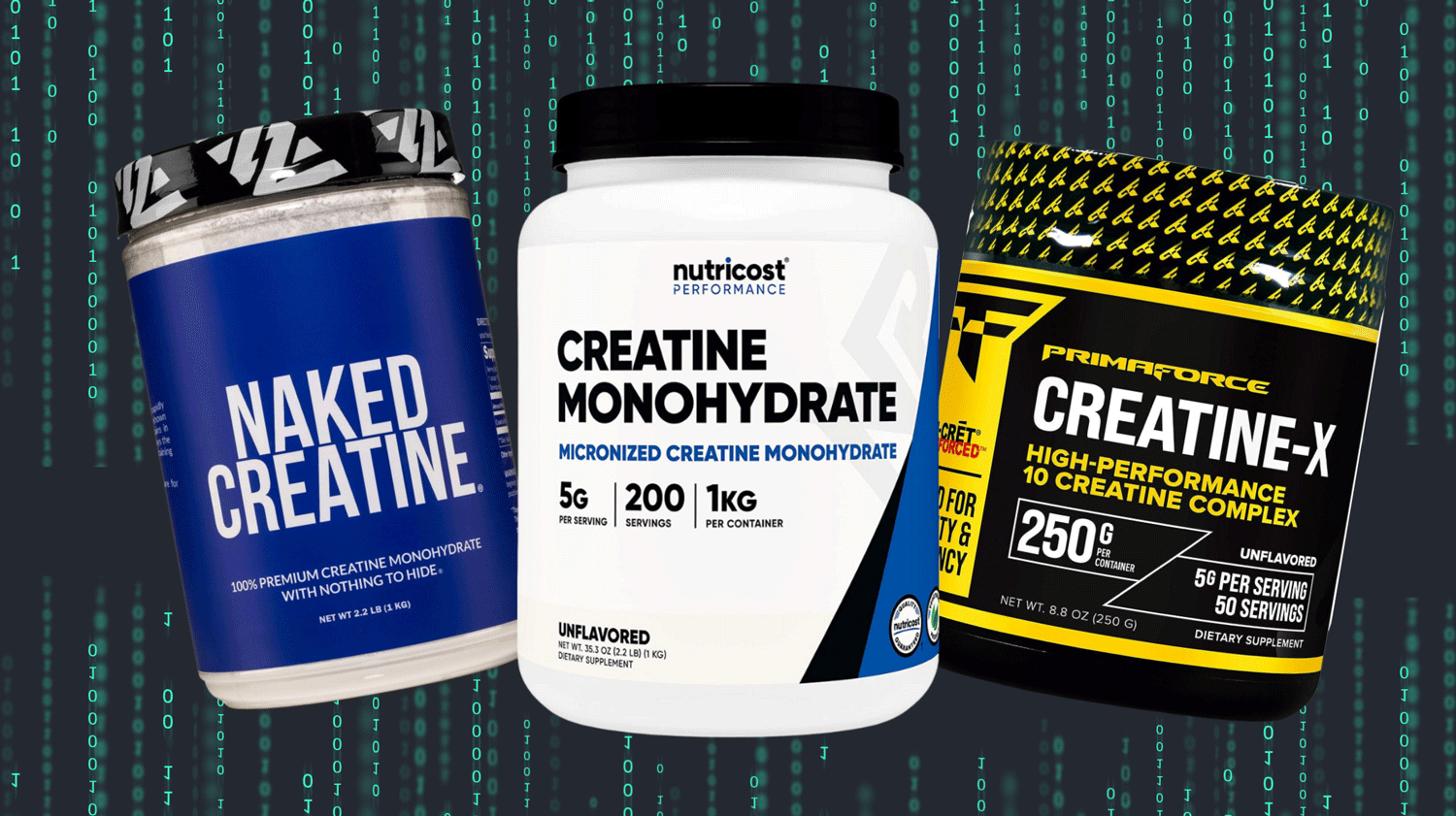What Are The Side Effects of Taking Creatine?
In Short: There are very few and they are all very minor.


For individuals dedicated to optimizing their gym performance through strategic nutrition, the appeal of creatine should not be underestimated. As a naturally occurring amino acid vital for energy production, creatine has likely captured your attention.
This adaptable compound is accessible via dietary supplements and specific foods, offering the potential to enhance your physical capabilities.
Among strength athletes, creatine has gained significant traction for valid reasons. Extensive research spanning five decades emphasizes its capacity to enhance strength, power output, muscle mass, and post-workout recovery.
This scientific landscape converges with dedicated training, propelling athletes towards greater accomplishments.


WHAT IS OUR #1 CREATINE SUPPLEMENT?
Check Our Ranking of the 12 Best Creatine Supplements for 2023
Nevertheless, every endeavor has potential drawbacks. Similar to any dietary supplement, the possibility of adverse effects accompanies creatine usage. Generally speaking, creatine is considered safe, thanks to thorough studies dispelling concerns about harmful consequences.
Yet, a cautionary point arises—the interaction between creatine and individual physiology remains partially unclear.
Venturing beyond speculation, we explore the scientific mechanisms underlying creatine’s effects, enriching your training regimen. However, this journey requires acknowledging potential side effects.
Defining Creatine
Creatine is a non-essential amino acid intricately woven into your body’s fabric, primarily within skeletal muscles and the cerebral domain. Synthesized from amino allies—arginine, glycine, and methionine—creatine takes center stage, enhancing your body’s intrinsic reserves.
Upon embracing creatine via supplementation, a transformative process begins, as this taken energy is converted into creatine phosphate, an influential phosphagen crucial for fueling high-intensity pursuits such as sprinting and weightlifting.
The infusion of creatine sparks the amplification of phosphocreatine concentration, turbocharging the production of adenosine triphosphate (ATP), the vital source of cellular energy. With ATP revitalized at an accelerated pace, fortified by the surge in phosphagens, imagine conquering challenges and dominating super-heavy deadlift sets with resolute determination.
Creatine emerges as the gateway, where scientific understanding intersects with dedicated aspiration, propelling you toward empowered athleticism and limitless performance enhancement.


Optimal Sources Elevating Creatine Levels
Boosting your creatine levels is within reach through targeted dietary choices and supplements. The pinnacle of research-backed supplements is creatine monohydrate, proven to amplify strength training benefits.
Creatine, a valuable carninutrient, resides exclusively in animal-derived protein-rich foods. For non-animal product consumers, amino acids like arginine, glycine, and methionine serve as precursors to creatine synthesis.
Here are the to forms of creatine supplements and foods with the highest amounts of creatine or creatine precursors:
- Creatine Monohydrate
- Creatine HCI
- Creatine HMB
- Creatine Kre-Alkalyn
- Meat selections like Steak, Ground Beef, Poultry
- Oceanic delights: Herring, Cod, Tuna, Salmon
- Parmesan Cheese, a dairy source
- Nutrient-rich Pumpkin Seeds, White Beans, Walnuts
While food sources have limitations, supplements offer efficient strength gains. However, food-based approaches mitigate potential side effects associated with supplements.
Exploring the Transformative Power of Creatine in Strength Training
Amplify Strength and Power


Enhancing Muscle Growth
Creatine supplementation and targeted resistance training is a dynamic pairing that propels muscle development. Extensive research underscores their symbiotic potency in cultivating lean muscle mass.
An exhaustive review of 35 studies involving 1195 participants delved into creatine’s impact on hypertrophy. Notably, those engaging in resistance training experienced a substantial two-pound gain in lean muscle mass. In contrast, groups pursuing mixed exercises or remaining sedentary showed negligible progress.
It’s essential to grasp that creatine alone isn’t the catalyst for muscle growth. Rather, when harmonized with devoted effort in muscle-strengthening routines, creatine emerges as a powerful enhancer.
Helping Recovery
Beyond its nutritional value, creatine plays a vital role in optimizing post-workout recuperation. Working in synergy with carbs and protein, creatine efficiently replenishes glycogen stores post-training. Its influence extends further as a potent antioxidant, actively curbing inflammation and alleviating muscle soreness.
What truly sets creatine apart is its ability to boost ATP production and enhance energy availability. This translates to heightened endurance during intense training, delaying the onset of fatigue. Your journey towards enhanced recovery is a continuous process woven seamlessly into each session.
Elevating Focus and Performance
Research into creatine’s effects on muscle function has a rich history, but recent studies reveal an exciting dimension: its potential to enhance brain health. Skeletal muscles house 80 percent of the body’s creatine, leaving 20 percent to nourish the brain. This distribution suggests creatine’s promise in augmenting cognition, processing, and overall brain function.
The brain’s significance extends to athletic success, with focus being pivotal for a robust mind-muscle connection. Creatine emerges as a catalyst, refining reaction time, coordination, and motor control crucial for peak athletic performance. Moreover, its ability to alleviate perceived mental fatigue extends training capacity, boosting endurance and output.


Creatine’s Side Effects and Potential Downsides
Potential Gastrointestinal Effects
Short-Term Water Retention
Potential Kidney Interactions
Long-Term Effects of Creatine


The Takaways
Here are the quick hit impacts of creatine on your body, highlighting both its advantages and potential drawbacks.
- Creatine, a crucial amino acid, acts as an energy reservoir known as phosphagen.
- Elevate creatine levels through supplements or animal-derived foods.
- Creatine enhances ATP, boosting muscular contractions for intense workouts.
- Backed by five decades of research, it’s linked to increased strength, muscle growth, and rapid recovery.
- It also offers cognitive benefits, sharpening focus during gym sessions.
- Deemed safe, concerns about side effects have largely been discredited.
- However, remain mindful of possible issues such as digestive discomfort, temporary water retention, and the limited study of kidney and long-term effects.
Worth the Risk for Greater Rewards?
Combine targeted resistance training with strategic creatine use for lean muscle gains. As you recover, creatine and nutrition unite to recharge, ensuring you approach each session with increased vigor.
Recent research dismisses major creatine concerns, revealing few negative effects. Digestive discomfort and temporary water retention might occur. Healthy kidneys seem unaffected, but caution prevails for those with renal issues.
Studies primarily cover short-term creatine use, leaving long-term effects uncertain. Even expert scientists can’t foresee what lies ahead.
By adopting creatine wisely, you affirm your dedication to progress. Guided by evidence and foresight, your path to optimal strength unfolds step by calculated step.
Your Creatine Questions… Answered.
Check out these related articles to learn more about creatine:

